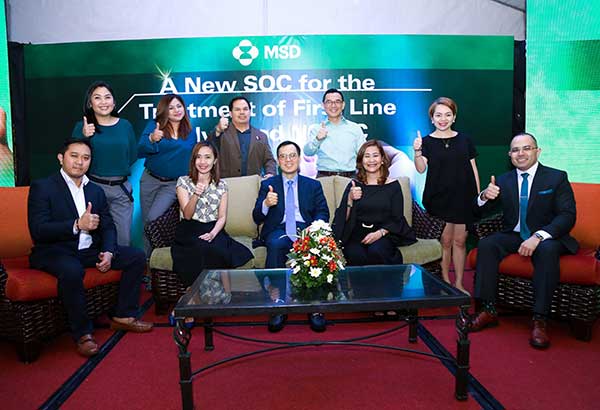Immunotherapy: A bright future for cancer treatment

It’s here!: MSD in the Philippines team joins oncology expert Prof. Byoung-Chul Cho, MD, PhD, at the announcement of pembrolizumab as an approved targeted immunotherapy drug for the first-line treatment of non-small-cell lung cancer.
MANILA, Philippines — In the past, the diagnosis of late-stage cancer for a patient invariably meant long periods of chemotherapy — a treatment that is just a little less deadly than the disease itself.
Recently, however, a new mode of therapy promises a better option with little side effects and much improved prospects for complete recovery and extension of life.
The treatment is called targeted immunotherapy, and drugs in this category have been successfully used in the United States since 2014 for the treatment of various advanced cancers.
The promise of immunotherapy is now a reality for Filipinos with the recent approval by the Philippine Food and Drug Administration (FDA) of a landmark drug called pembrolizumab as first-line treatment for non-small cell lung cancer (NSCLC), a specific type of lung malignancy.
Oncology expert Prof. Byoung-Chul Cho, MD from the Yonsei University College of Medicine in South Korea was recently in Manila to explain the efficacy and unparalleled benefits of pembrolizumab to medical specialists invited to a symposium organized by MSD in the Philippines, the distributor of the drug.
As we all learned in school, the immune system keeps us well by identifying and destroying cells inside our body that can cause sickness. One of the main ways the immune system does this is with T cells.
T cells are like security guards of the body. They hunt down and destroy harmful bacteria, viruses, and other enemies of the body. On the other hand, cancer cells are normal body cells that have mutated — they are like friends that have become enemies. Because cancer cells no longer look like normal cells, T cells are supposed to find and destroy them. And yet, there are times when T cells do not do this. “Cancer cells are very good at making themselves look like a friend by expressing PD-L1,” explains Dr. Cho.
PD-L1 is a protein that cancer cells express when they meet T cells. Some T cells have a “weak spot” called the PD1 surface receptor. When a cancer cell expressing PD-L1 meets a T cell with a PD1 receptor, the cancer cell uses its PD-L1 to attach to the T cell using the PD1 pathway. Once the cancer cell is attached to the T cell, the latter is no longer able to identify the cancer cell as an enemy. And so the cancer is able to safely multiply and spread.
Targeted immunotherapy such as pembrolizumab “takes the brakes off” of T cells in battling cancer cells, in the words of Dr. Cho. By blocking the interaction between PD-L1 from the cancer cell and PD1 in the T cell, the cancer cell—now unable to attach to the T cell—can no longer hide its true evil identity.
As a targeted immunotherapy drug, pembrolizumab boosts and maximizes one of the most important functions of the immune system — memory. “Once the immune system is able to recognize a tumor cell, the T cell transforms into a memory T cell, and it acts against the tumor cell forever,” reveals Dr. Cho.
The result is nothing less than a breakthrough in the field of cancer treatment. “When we used chemotherapy, the duration of response in cancer patients was usually less than five months. With targeted chemotherapy, it was less than a year. But for targeted immunotherapy, we have seen studies where 30 percent of the patients showed response durations of more than two years,” emphasized Dr. Cho.
Dr. Cho has personally witnessed the efficacy of targeted immunotherapy in his own clinical practice: “I had a patient, around 50 years old, male, and a smoker. He participated in the clinical study of pembrolizumab, so he received treatment for two years. Based on the study protocol, we stopped giving him the drug after two years. But several months later, he was still very well, without any tumor relapse.”
Dr. Cho noted that had this been a targeted chemotherapy regimen, they would have expected to see tumor relapse within two to three months. “That is the glory of targeted immunotherapy. We are learning to utilize the memory function of the immune system,” he enthused.
“In some advanced-stage NSCLC, the only therapeutic option that gives the patient long-term survival is targeted immunotherapy,” asserts Dr. Cho.
One important factor in assessing whether an NSCLC patient will be responsive to pembrolizumab is the patient’s level of PD-L1 expression.
Other cancers, such as advanced melanoma, have been shown to be responsive to the drug regardless of PD-L1 expression. But in the case of NSCLC, researchers have found that the best response is seen among patients with more than 50 percent of tumor cells expressing PD-L1. This is around one-third of patients.
“We still need to do more studies to understand why PD-L1 is important for some cancers but not for others,” remarks Dr. Cho.
When a patient with NSCLC meets the criteria for targeted immunotherapy treatment, Dr. Cho has no hesitations recommending it. “The serious adverse effects of targeted immunotherapy are just one-third to one-fourth that of chemotherapy,” he points out.
He notes that previous studies of melanoma treated with chemotherapy showed patients living for only six to eight months. But among melanoma patients treated with targeted immunotherapy, 20 to 30 percent of them lived for more than 10 years.
If the same results are eventually seen in clinical studies with NSCLC, “it would be a dream come true,” Dr. Cho concludes.


















